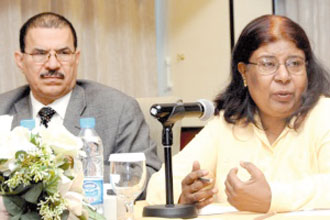
|
 |
 |
|
|
|
|
|
|
|
|
|
|
|
|
|
|
|
|
|
|
|
|
|
|
Two Reports:
|
 |
On other hand, the report criticised the Universal Periodic Review Steering Committee for lacking competency in assessing and monitoring Bahrain’s performance in improving human rights. The BHRS also criticised the Government’s performance regarding the implementation of its voluntary commitments, whilst also pointing to the fact that Government agencies have failed to adapt effectively with civil society organizations. The BHRS believes that the Steering Committee’s report only reflects the Government’s point of view and not the opinion of civil society organizations.
The BHRS’s report also criticised the passing of the Family Law (Sunni section) as this will reinforce sectarianism, and demanded a unified Family Law for all Bahraini families. The report also criticised the Government for its refusal to ratify four international agreements, which were proposed by the House of Representatives regarding employment. The BHRS hoped that joining International agreements by Bahrain will be reflected in the national legislation.
The report also criticised the Government for failing to take any practical steps to pass laws that criminalise all forms of violence against women including domestic violence. It also criticised the Government for not taking concrete measures to protect the rights of domestic workers based on the recommendations of the UN Committee on the Elimination of Racial Discrimination. This Committee calls on Bahrain to take effective measures in order to combat the problems associated with female domestic workers.
 |
The second report was issued by Freedom House, which assesses the condition of women’s rights in Bahrain. The report recommended that the Bahraini Government should treat both genders equally during court procedures and should pass a unified Personal Status Law. The report also recommended the setting up of specialized committees, which are primarily concerned with monitoring and implementing the CEDAW agreement. It also recommended that the Bahraini Women’s Union cooperate with international organizations in order to remove all Governmental reservations, as long as these reservations do not contradict the Islamic Sharia law. Moreover, the report recommended that the Bahraini government withdraw all its reservations on the CEDAW and to make Bahraini law compatible with international agreements by granting women equal rights in nationality, housing, marriage and custody.
In addition, the report recommended that the Government passes legislation, which eliminates domestic violence, introduces deterrent punishments, and trains both the police force and the public prosecutor in implementing these legislations. In addition the report proposed an increase in NGOs’ budget, which will increase the capacity of shelters for abused women and help monitor the conditions of the poor, including housemaids. Also, the Government should set up specialized units that are primarily concerned with implementing laws regarding human trafficking trails, whereby the victims are given immunity from charges of prostitution and illegal immigration. The victims should also be given enough protection, rehabilitation and encouraged to testify against their captives or abusers.
With regards to women’s political representation, the report recommended the training of women candidates on how to successfully manage political campaigns, gain public support, and effectively make use of the media. Moreover, the report recommended that Article 123 of the Penal Code be annulled so that everyone can participate in the meetings and discussions with foreign organizations regarding Bahraini issues without fear from legal prosecution.
Also, the report recommended that the Bahraini Government appoints more women in the Shura Council, the Judiciary, Sharia Courts and in decision-making positions. The Government should also fund cultural awareness programs associated with domestic violence and human trafficking. Finally, it recommended that the Women’s Union sets up a website on women’s issues in Bahrain in order to promote greater awareness about women’s rights.